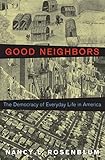Good Neighbors : The Democracy of Everyday Life in America / Nancy L. Rosenblum.
Material type: TextPublisher: Princeton, NJ : Princeton University Press, [2016]Copyright date: ©2016Description: 1 online resource (312 p.)Content type:
TextPublisher: Princeton, NJ : Princeton University Press, [2016]Copyright date: ©2016Description: 1 online resource (312 p.)Content type: - 9780691169439
- 9781400881314
- Civil society -- United States
- Civil society -- United States
- Democracy -- Social aspects -- United States
- Democracy -- Social aspects -- United States
- Neighborliness -- United States
- Neighborliness -- United States
- PHILOSOPHY / Political
- American literature
- Americans
- Development Review Board
- General Unsightliness Ordinance
- Hurricane Katrina
- Japanese evacuation
- Panoptical society
- Thoreau
- Walden
- betrayal
- conformity
- control system
- cosmopolitanism
- cultural ethnography
- decent folk
- decivilization
- democracy
- disasters
- disorder
- emergency situations
- enforcers
- everyday encounters
- everyday life
- exclusion
- extreme conditions
- friends
- globalization
- good citizen
- good neighbor
- good neighbors
- happiness
- home life
- immigrant
- informers
- intimate violence
- local ordinances
- lynching
- moral identity
- moral psychology
- moral resources
- murder
- mutual advantage
- mutual vulnerability
- natural disasters
- neighbor relations
- neighbors
- neighbourliness
- offensive neighbor
- ordered society
- ordinary vices
- organized violence
- organized volunteers
- political identity
- political theory
- proximity
- reciprocity
- reproach
- rescue
- self-examination
- self-representation
- settler
- singular offense
- social interactions
- strangers
- suburban portrayals
- survivor narratives
- terrorization
- 307.33620973 23
- JK1759 .R89 2018
- online - DeGruyter
- Issued also in print.
| Item type | Current library | Call number | URL | Status | Notes | Barcode | |
|---|---|---|---|---|---|---|---|
 eBook
eBook
|
Biblioteca "Angelicum" Pont. Univ. S.Tommaso d'Aquino Nuvola online | online - DeGruyter (Browse shelf(Opens below)) | Online access | Not for loan (Accesso limitato) | Accesso per gli utenti autorizzati / Access for authorized users | (dgr)9781400881314 |
Frontmatter -- Contents -- Introduction: Good Neighbor Nation -- PART I. The Lay of the Land -- 1. Who Is My Neighbor? -- 2. Narrative Threads: Settlers, Immigrants, and Suburban "Grotesques" -- PART II. The Democracy of Everyday Life -- 3. Reciprocity among "Decent Folk" -- 4. Taking Offense, Speaking Out -- 5. What Anyone Would Do, Here -- 6. Live and Let Live -- PART III. Holding Our Lives in Their Hands -- 7. Betrayal -- 8. Killing -- 9. Disasters -- PART IV. Minding Our Own Business -- 10. Thoreau's Neighbors -- Conclusion: Political Theory and the Democracy of Everyday Life in America -- Acknowledgments -- Notes -- Index
restricted access online access with authorization star
http://purl.org/coar/access_right/c_16ec
"Love thy neighbor" is an impossible exhortation. Good neighbors greet us on the street and do small favors, but neighbors also startle us with sounds at night and unleash their demons on us, they monitor and reproach us, and betray us to authorities. The moral principles prescribed for friendship, civil society, and democratic public life apply imperfectly to life around home, where we interact day to day without the formal institutions, rules of conduct, and means of enforcement that guide us in other settings.In Good Neighbors, Nancy Rosenblum explores how encounters among neighbors create a democracy of everyday life, which has been with us since the beginning of American history and is expressed in settler, immigrant, and suburban narratives and in novels, poetry, and popular culture. During disasters, like Hurricane Katrina, the democracy of everyday life is a resource for neighbors who improvise rescue and care. Degraded, this framework can give way to betrayal by neighbors, as faced by the Japanese Americans interned during World War II, or to terrible violence such as the lynching of African Americans. Under extreme conditions the barest act of neighborliness is a bulwark against total ethical breakdown. The elements of the democracy of everyday life-reciprocity, speaking out, and "live and let live"-comprise a democratic ideal not reducible to public principles of justice or civic virtue, but it is no less important. The democracy of everyday life, Rosenblum argues, is the deep substrate of democracy in America and can be its saving remnant.
Issued also in print.
Mode of access: Internet via World Wide Web.
In English.
Description based on online resource; title from PDF title page (publisher's Web site, viewed 29. Jul 2021)


